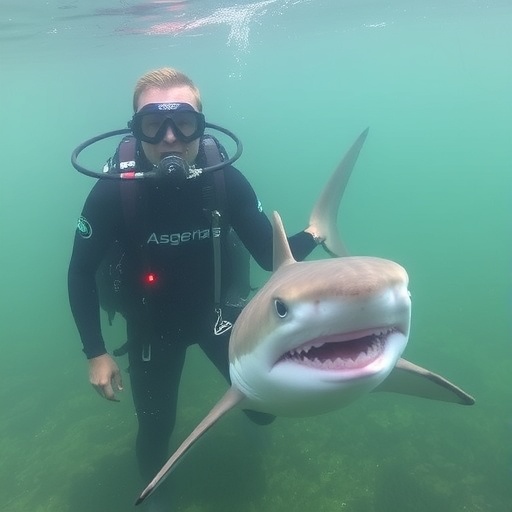In the remote South Atlantic, Ascension Island has become a focal point for groundbreaking research into the intricate relationship between humans and sharks, illuminating key social dimensions that are crucial for the conservation of these apex predators. Despite being a small UK territory with a community of approximately 800 residents, Ascension Island experiences significant interactions between its inhabitants and a diverse shark population, predominantly silky and Galapagos sharks. These interactions present complex challenges for both conservationists and local fishers, revealing how human attitudes toward sharks can profoundly influence conservation outcomes.
Shark-human conflict on Ascension Island extends beyond the immediate physical threat posed by attacks. In 2017 alone, the island recorded two non-fatal shark attacks, one resulting in a life-threatening injury. These events have amplified fear and anxiety, affecting the social fabric and ocean use habits of local communities. Recent research led by the University of Exeter in collaboration with the Zoological Society of London (ZSL) has sought to unpack these social impacts by conducting interviews with island residents. The study reveals that perceptions of shark behavior and population dynamics are highly variable, and community members struggle to define what constitutes normal shark presence and behavior around the island.
This variability in perception complicates effective shark management. Many inhabitants report that shark activity has intensified over the past decade, with sharks regularly interfering with recreational fishing by biting through fishing lines or stealing catch. Such interactions have fostered negative attitudes toward sharks, potentially undermining conservation efforts. The research underscores the necessity of a nuanced approach that recognizes the diverse factors driving human-shark conflict—including ecological, behavioral, and psychological dimensions.
One of the pivotal findings from this study is the recognition of hidden psychosocial consequences associated with shark encounters. The fear and stress induced by shark presence have led some individuals to alter their daily routines and reduce ocean-related activities, reflecting a profound shift in lifestyle rooted in perceived risk. The research team emphasizes that these psychosocial effects are an essential component of human-wildlife conflict and must be addressed alongside ecological considerations.
In an effort to safeguard marine biodiversity, Ascension Island was designated a Marine Protected Area (MPA) in 2019. This designation allows only recreational fishing in nearshore waters up to 12 nautical miles from the coast, while prohibiting all fishing activities from 12 to 200 nautical miles offshore. Despite these protections, reports of shark-human interactions have risen, reflecting either increased shark abundance or possibly changes in shark behavior linked to environmental factors. The fluctuating shark dynamics and incomplete understanding of their drivers have fueled persistent anxiety among the island population.
The research highlights a critical knowledge gap relating to shark ecology and human perceptions thereof. Some residents attribute abnormal shark behaviors to past practices such as “chumming,” where fish scraps are dispersed in the water to attract fish. There is, however, considerable uncertainty about which shark species are primarily responsible for interactions and how human activities have affected shark presence. This ambiguity exacerbates community anxiety and complicates the development of effective management strategies.
Experts like Dr. Claire Collins advocate for the implementation of evidence-based, widely agreed-upon information dissemination to empower local communities with accurate knowledge about shark ecology and behavior. Such informed engagement could demystify sharks, reduce unfounded fears, and foster coexistence. Providing accessible scientific insights is an essential step to align public perception with ecological realities, ultimately supporting long-term conservation.
Furthermore, Dr. Sam Weber from the Centre for Ecology and Conservation stresses that sharks are among the most threatened marine species globally. He asserts that maintaining public support for shark conservation is contingent upon understanding and minimizing conflicts. Increasing transparency and involving local communities in research and decision-making processes can prevent conflict escalation and contribute to sustainable coexistence.
This research emerges from a broader initiative funded by the UK Darwin Initiative and the Save Our Seas Foundation. The larger project employs sophisticated shark tracking technology to elucidate movement patterns and habitat use around Ascension Island. By mapping how sharks navigate their environment and respond to changes, scientists aim to inform targeted conservation measures that mitigate negative interactions with humans.
Tiffany Simpson of AIG Conservation underscores the significance of this multidisciplinary investigation in bridging critical knowledge gaps. She remarks that this project marks the beginning of efforts to unravel the complex drivers behind shark behavior, such as migratory routes and habitat preferences, with the ultimate goal of devising interventions that reduce potential conflict without compromising shark protection.
The burgeoning body of evidence from this research emphasizes that successful shark conservation in remote marine protected areas hinges on integrating ecological data with social science insights. Understanding human attitudes, addressing psychological impacts, and fostering community participation emerge as fundamental pillars alongside biological research. Ascension Island serves as a compelling case study in highlighting the interconnectedness of human and natural systems in marine conservation.
Published in the journal People and Nature, the study titled “Social dimensions of shark-human interactions in a large remote Marine Protected Area” provides a sophisticated framework that can be adapted globally. It illustrates the urgent need for multi-faceted conservation strategies that acknowledge and respect the values, fears, and experiences of local populations while promoting the survival of ecologically critical species like sharks.
As marine ecosystems worldwide face unprecedented pressures, research such as this not only elevates scientific understanding but also aligns human perception with conservation imperatives. The lessons learned from Ascension Island may chart a viable path forward in managing shark populations responsibly, fostering coexistence, and ultimately reversing the alarming global decline in shark numbers.
Subject of Research: Social dimensions and human perceptions of shark interactions in a remote Marine Protected Area.
Article Title: Social dimensions of shark-human interactions in a large remote Marine Protected Area.
News Publication Date: 10-Oct-2025.
Web References: http://dx.doi.org/10.1002/pan3.70131
Image Credits: Kate Downes.
Keywords: Marine fishes, Marine biodiversity, Marine conservation.




